(完整word版)六年级英语一般现在时讲解加练习
- 格式:doc
- 大小:19.88 KB
- 文档页数:5
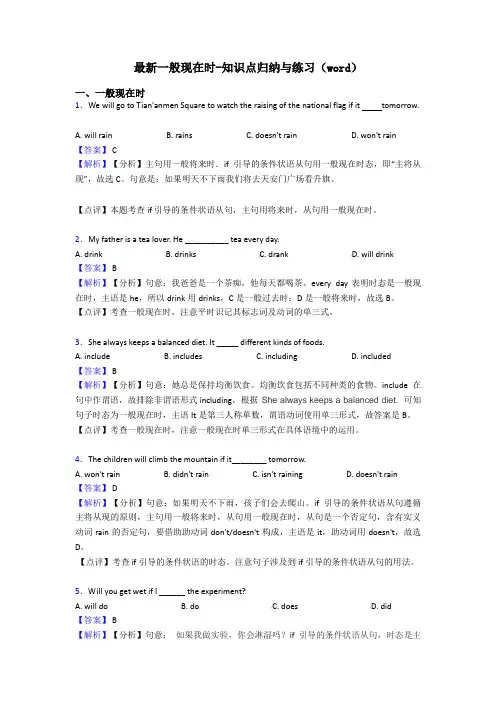
最新一般现在时-知识点归纳与练习(word)一、一般现在时1.We will go to Tian'anmen Square to watch the raising of the national flag if it tomorrow.A. will rainB. rainsC. doesn't rainD. won't rain【答案】 C【解析】【分析】主句用一般将来时.if引导的条件状语从句用一般现在时态,即“主将从现”,故选C。
句意是:如果明天不下雨我们将去天安门广场看升旗。
【点评】本题考查if 引导的条件状语从句,主句用将来时,从句用一般现在时。
2.My father is a tea lover. He __________ tea every day.A. drinkB. drinksC. drankD. will drink【答案】 B【解析】【分析】句意:我爸爸是一个茶痴,他每天都喝茶。
every day表明时态是一般现在时,主语是he,所以drink用drinks,C是一般过去时;D是一般将来时,故选B。
【点评】考查一般现在时,注意平时识记其标志词及动词的单三式。
3.She always keeps a balanced diet. It _____ different kinds of foods.A. includeB. includesC. includingD. included【答案】 B【解析】【分析】句意:她总是保持均衡饮食。
均衡饮食包括不同种类的食物。
include在句中作谓语,故排除非谓语形式including,根据She always keeps a balanced diet.可知句子时态为一般现在时,主语It是第三人称单数,谓语动词使用单三形式,故答案是B。
【点评】考查一般现在时,注意一般现在时单三形式在具体语境中的运用。
4.The children will climb the mountain if it________ tomorrow.A. won't rainB. didn't rainC. isn't rainingD. doesn't rain【答案】 D【解析】【分析】句意:如果明天不下雨,孩子们会去爬山。
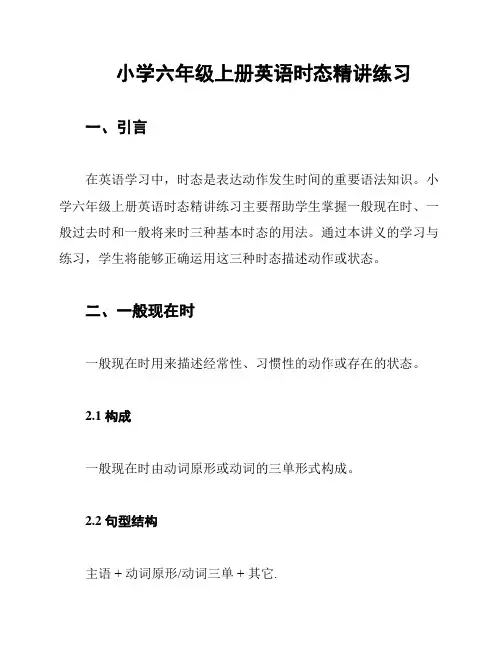
小学六年级上册英语时态精讲练习一、引言在英语学习中,时态是表达动作发生时间的重要语法知识。
小学六年级上册英语时态精讲练习主要帮助学生掌握一般现在时、一般过去时和一般将来时三种基本时态的用法。
通过本讲义的学习与练习,学生将能够正确运用这三种时态描述动作或状态。
二、一般现在时一般现在时用来描述经常性、习惯性的动作或存在的状态。
2.1 构成一般现在时由动词原形或动词的三单形式构成。
2.2 句型结构主语 + 动词原形/动词三单 + 其它.2.3 练习1. I (eat)_____ breakfast every morning.2. She (go)_____ to school by bus.3. The cat (sleep)_____ on the sofa.三、一般过去时一般过去时用来描述过去发生的动作或存在的状态。
3.1 构成一般过去时由动词的过去式构成。
3.2 句型结构主语 + 动词过去式 + 其它.3.3 练习1. I (watch)_____ a movie yesterday.2. She (visit)_____ her grandparents last week.3. They (play)_____ soccer in the park.四、一般将来时一般将来时用来描述将来要发生的动作或存在的状态。
4.1 构成一般将来时有两种构成方式:will + 动词原形和 be going to + 动词原形。
4.2 句型结构1. 主语 + will + 动词原形 + 其它.2. 主语 + be going to + 动词原形 + 其它.4.3 练习1. I (buy)_____ a new bike next month.2. She (travel)_____ to Japan with her family.3. They (move)_____ to a new house in two years.五、总结通过本讲义的学习与练习,学生应掌握一般现在时、一般过去时和一般将来时三种基本时态的构成、句型结构和用法。
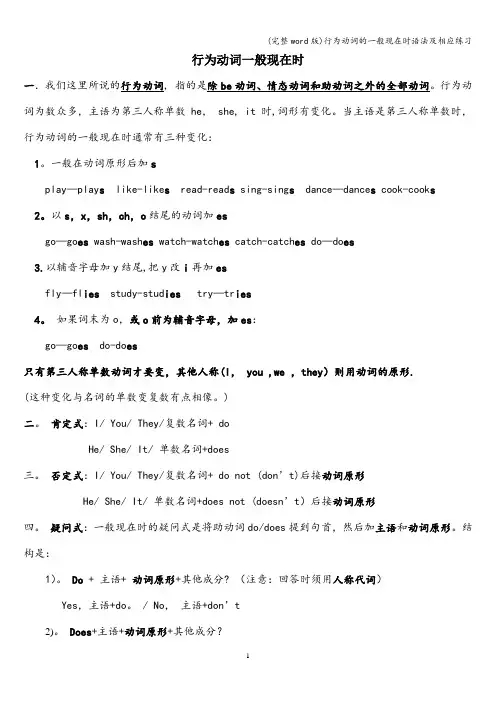
行为动词一般现在时一.我们这里所说的行为动词, 指的是除be动词、情态动词和助动词之外的全部动词。
行为动词为数众多,主语为第三人称单数he, she, it时,词形有变化。
当主语是第三人称单数时,行为动词的一般现在时通常有三种变化:1。
一般在动词原形后加splay—play s like-like s read-read s sing-sing s dance—dance s cook-cook s2。
以s,x,sh,ch,o结尾的动词加esgo—go es wash-wash es watch-watch es catch-catch es do—do es3.以辅音字母加y结尾,把y改i再加esfly—fl ies study-stud ies try—tr ies4。
如果词末为o,或o前为辅音字母,加es:go—go es do-do es只有第三人称单数动词才要变,其他人称(I, you ,we ,they)则用动词的原形.(这种变化与名词的单数变复数有点相像。
)二。
肯定式:I/ You/ They/复数名词+ doHe/ She/ It/ 单数名词+does三。
否定式:I/ You/ They/复数名词+ do not (don’t)后接动词原形He/ She/ It/ 单数名词+does not (doesn’t)后接动词原形四。
疑问式:一般现在时的疑问式是将助动词do/does提到句首,然后加主语和动词原形。
结构是:1)。
Do + 主语+ 动词原形+其他成分? (注意:回答时须用人称代词)Yes,主语+do。
/ No,主语+don’t2)。
Does+主语+动词原形+其他成分?Yes,主语+does。
/ No, 主语+doesn’t.(注意:回答时须用人称代词)五. 那么,什么情况下用行为动词的一般现在时呢?当这个动作经常发生或表示习惯性的动作时,通常用一般现在时,它经常与表示频度的时间状语连用,如,当句子中有every day every year ,on Sunday, in the morning ,often, sometimes,usually, at one o’clock等词时,用一般现在时。
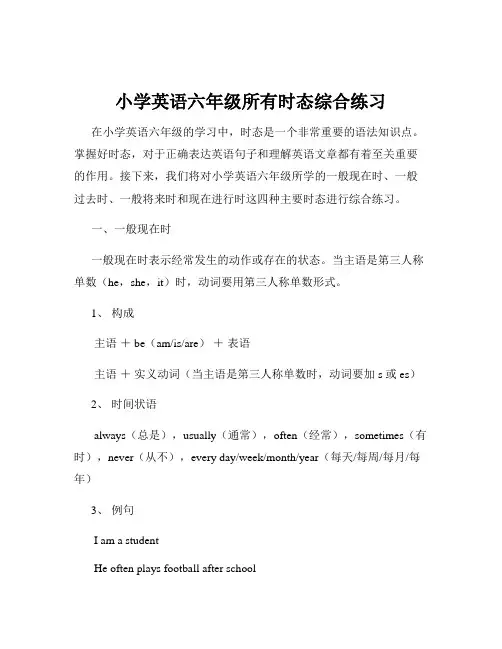
小学英语六年级所有时态综合练习在小学英语六年级的学习中,时态是一个非常重要的语法知识点。
掌握好时态,对于正确表达英语句子和理解英语文章都有着至关重要的作用。
接下来,我们将对小学英语六年级所学的一般现在时、一般过去时、一般将来时和现在进行时这四种主要时态进行综合练习。
一、一般现在时一般现在时表示经常发生的动作或存在的状态。
当主语是第三人称单数(he,she,it)时,动词要用第三人称单数形式。
1、构成主语+ be(am/is/are)+表语主语+实义动词(当主语是第三人称单数时,动词要加 s 或 es)2、时间状语always(总是),usually(通常),often(经常),sometimes(有时),never(从不),every day/week/month/year(每天/每周/每月/每年)3、例句I am a studentHe often plays football after schoolThey are very happy练习:1、 My father ______ (watch) TV every night2、 She ______ (like) music very much3、 The children often ______ (play) in the park二、一般过去时一般过去时表示过去发生的动作或存在的状态。
1、构成主语+ was/were +表语主语+动词的过去式2、时间状语yesterday(昨天),last week/month/year(上周/上个月/去年),ago(以前),in +过去的年份3、例句I was at home yesterdayThey played basketball last weekHe went to Beijing two years ago练习:1、 We ______ (have) a party last night2、 She ______ (buy) a new dress yesterday3、 He ______ (do) his homework an hour ago三、一般将来时一般将来时表示将来要发生的动作或存在的状态。
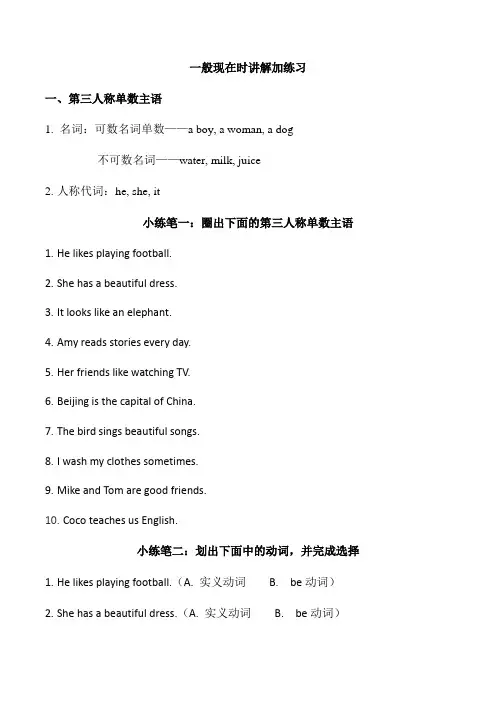
一般现在时讲解加练习一、第三人称单数主语1. 名词:可数名词单数——a boy, a woman, a dog不可数名词——water, milk, juice2.人称代词:he, she, it小练笔一:圈出下面的第三人称单数主语1.He likes playing football.2.She has a beautiful dress.3.It looks like an elephant.4.Amy reads stories every day.5.Her friends like watching TV.6.Beijing is the capital of China.7.The bird sings beautiful songs.8.I wash my clothes sometimes.9.Mike and Tom are good friends.10.Coco teaches us English.小练笔二:划出下面中的动词,并完成选择1.He likes playing football.(A. 实义动词 B. be动词)2.She has a beautiful dress.(A. 实义动词 B. be动词)3.It looks like an elephant.(A. 实义动词 B. be动词)4.Amy reads stories every day.(A. 实义动词 B. be动词)5.Her friends like watching TV.(A. 实义动词 B. be动词)6.Beijing is the capital of China.(A. 实义动词 B. be动词)7.The bird sings beautiful songs.(A. 实义动词 B. be动词)8.I wash my clothes sometimes.(A. 实义动词 B. be动词)9.Mike and Tom are good friends.(A. 实义动词 B. be动词)10.Coco teaches us English.(A. 实义动词 B. be动词)思考通过小练笔一和小练笔二,你发现了什么规律?当主语是_________________的时候,实义动词的样子是什么呢?____________________________________________________________________ 当主语是_________________的时候,be的样子是什么呢?____________________________________________________________________ 二、实义动词由动词原形变成第三人称单数规则1)__________________________________________________2)__________________________________________________3)__________________________________________________4)__________________________________________________小练笔三:写出下列动词的第三人称单数形式e_________________ watch_________________ fly ___________________ study_________________ think_________________ go___________________ stay _________________ make _________________ look__________________ have_________________pass__________________ carry _________________ cry __________________ wash _________________ sit___________________ do___________________ teach_________________ run___________________ play___________________ miss___________________小练笔四:用括号内动词的适当形式填空A1.I______________ ( be)a singer.2.You______________( be ) a doctor .3.______________( be ) he a coach?4.She often______________( go ) to school by subway .5.He sometimes______________( do ) her homework at school.B1.We_____________( go ) to see our parents every month .2.Amy often_____________(have) dinner at home.3.Jack and Tom_____________(be) in Class Two.4.They_____________(watch) TV on Mondays.5.Mike_____________( go) to the zoo on Sundays.一般现在时句型转换——肯定句变否定句一、句子中的动词是be动词时步骤:1.划出be动词2.在be动词后,加上notShe is quiet.__________________________________________________二、句子中的动词是实义动词时步骤:1.划出句子中的实义动词2.区分两种情况:1)句子中的实义动词是动词原形时,在动词前面,加上don’tThey go to the supermarket.__________________________________________________2)句子中的实义动词是动词的第三人称单数形式时,在动词前面,加上doesn’t He plays football every day.__________________________________________________小练笔1:将下列句子变为否定句1.Mary is a shy girl.____________________________________________________2.She is busy on weekends.______________________________________________3.I am ready to learn to play the guitar._____________________________________4.He goes to school by bike.______________________________________________5.Mike and Bob like drawing pictures.______________________________________小练笔2:单项选择()1. She__________ a hardworking student?A.isB. amC. are()2. He doesn’t__________ a bike every day.A.rideB. ridingC. rides()3. Mike doesn’t __________watch TV at night.A.watchesB. watchC. watching()4. I __________ a ic book.A.hasB. to haveC. have()5. Your sister __________ hard.A.worksB. workingC. work一般现在时句型转换——肯定句变一般疑问句一、句子中的动词是be动词时步骤:3.划出be动词4.把be动词放到句子的最前面去,然后把句号变成问号She is quiet.__________________________________________________二、句子中的动词是实义动词时步骤:3.划出句子中的实义动词4.区分两种情况:3)句子中的实义动词是动词原形时,在句子的最前面,加入do,句号变成问号They go to the supermarket.__________________________________________________4)句子中的实义动词是动词的第三人称单数形式时,在句子的最前面,加入does,does后要用动词原形,句号变成问号He plays football every day.__________________________________________________小练笔1:将下列句子变为一般疑问句1.Mary is a shy girl.____________________________________________________2.She is busy on weekends.______________________________________________3.I am ready to learn to play the guitar._____________________________________4.He goes to school by bike.______________________________________________5.Mike and Bob like drawing pictures.______________________________________小练笔2:单项选择()1.__________ she a hardworking student?A.IsB. AmC. Are()2. Does he__________ a bike every day?A.rideB. ridingC. rides()3. Does Mike __________watch TV at night?A.watchesB. watchC. watching()4. Do you __________ a ic book?A.hasB. to haveC. have()5. __________ your sister __________ hard?A.DoB. IsC. Does。
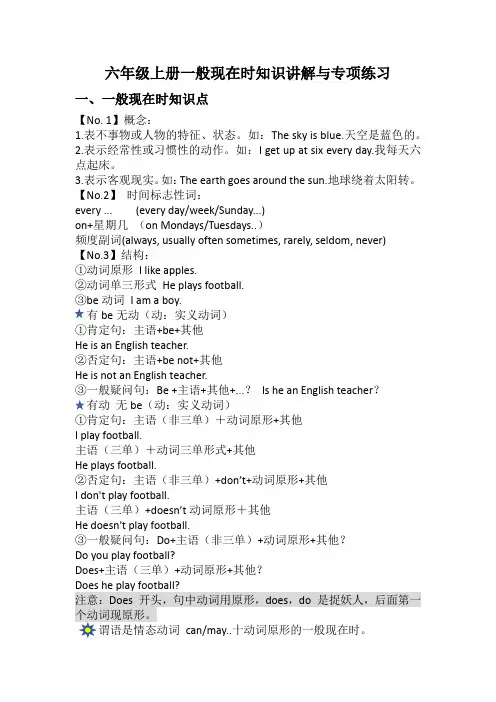
六年级上册一般现在时知识讲解与专项练习一、一般现在时知识点【No. 1】概念:1.表不事物或人物的特征、状态。
如:The sky is blue.天空是蓝色的。
2.表示经常性或习惯性的动作。
如:I get up at six every day.我每天六点起床。
3.表示客观现实。
如:The earth goes around the sun.地球绕着太阳转。
【No.2】时间标志性词:every ... (every day/week/Sunday...)on+星期几(on Mondays/Tuesdays..)频度副词(always, usually often sometimes, rarely, seldom, never)【No.3】结构:①动词原形I like apples.②动词单三形式He plays football.③be动词I am a boy.有be无动(动:实义动词)①肯定句:主语+be+其他He is an English teacher.②否定句:主语+be not+其他He is not an English teacher.③一般疑问句:Be +主语+其他+...?Is he an English teacher?有动无be(动:实义动词)①肯定句:主语(非三单)+动词原形+其他I play football.主语(三单)+动词三单形式+其他He plays football.②否定句:主语(非三单)+don’t+动词原形+其他I don't play football.主语(三单)+doesn’t动词原形+其他He doesn't play football.③一般疑问句:Do+主语(非三单)+动词原形+其他?Do you play football?Does+主语(三单)+动词原形+其他?①肯定形式:主语十情态动词can/may+动词原形+宾语。
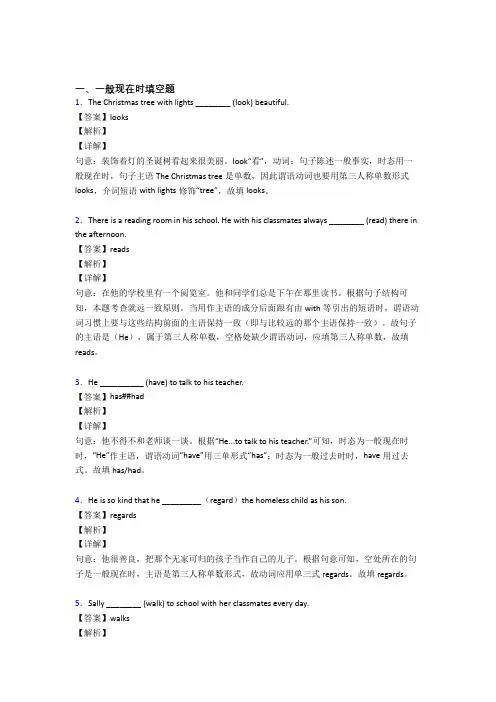
一、一般现在时填空题1.The Christmas tree with lights ________ (look) beautiful.【答案】looks【解析】【详解】句意:装饰着灯的圣诞树看起来很美丽。
look“看”,动词;句子陈述一般事实,时态用一般现在时,句子主语The Christmas tree是单数,因此谓语动词也要用第三人称单数形式looks,介词短语with lights修饰“tree”,故填looks。
2.There is a reading room in his school. He with his classmates always ________ (read) there in the afternoon.【答案】reads【解析】【详解】句意:在他的学校里有一个阅览室。
他和同学们总是下午在那里读书。
根据句子结构可知,本题考查就远一致原则。
当用作主语的成分后面跟有由with等引出的短语时,谓语动词习惯上要与这些结构前面的主语保持一致(即与比较远的那个主语保持一致)。
故句子的主语是(He),属于第三人称单数,空格处缺少谓语动词,应填第三人称单数,故填reads。
3.He __________ (have) to talk to his teacher.【答案】has##had【解析】【详解】句意:他不得不和老师谈一谈。
根据“He...to talk to his teacher.”可知,时态为一般现在时时,“He”作主语,谓语动词“have”用三单形式“has”;时态为一般过去时时,have用过去式。
故填has/had。
4.He is so kind that he _________(regard)the homeless child as his son.【答案】regards【解析】【详解】句意:他很善良,把那个无家可归的孩子当作自己的儿子。
根据句意可知,空处所在的句子是一般现在时,主语是第三人称单数形式,故动词应用单三式regards。
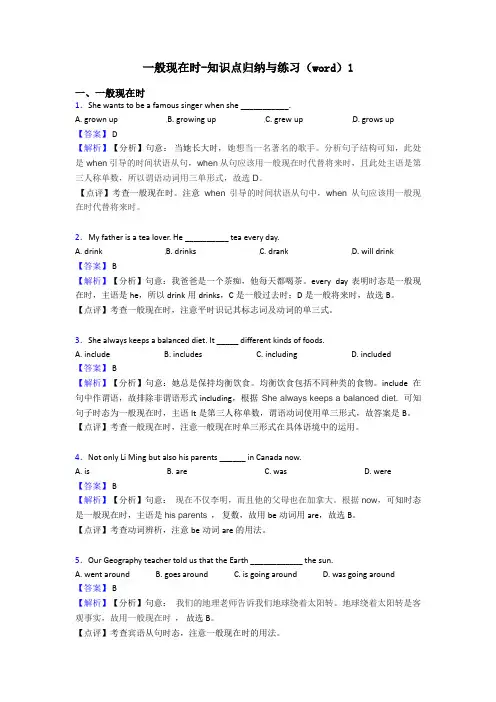
一般现在时-知识点归纳与练习(word)1一、一般现在时1.She wants to be a famous singer when she ___________.A. grown upB. growing upC. grew upD. grows up【答案】 D【解析】【分析】句意:当她长大时,她想当一名著名的歌手。
分析句子结构可知,此处是when引导的时间状语从句,when从句应该用一般现在时代替将来时,且此处主语是第三人称单数,所以谓语动词用三单形式,故选D。
【点评】考查一般现在时。
注意when引导的时间状语从句中,when从句应该用一般现在时代替将来时。
2.My father is a tea lover. He __________ tea every day.A. drinkB. drinksC. drankD. will drink【答案】 B【解析】【分析】句意:我爸爸是一个茶痴,他每天都喝茶。
every day表明时态是一般现在时,主语是he,所以drink用drinks,C是一般过去时;D是一般将来时,故选B。
【点评】考查一般现在时,注意平时识记其标志词及动词的单三式。
3.She always keeps a balanced diet. It _____ different kinds of foods.A. includeB. includesC. includingD. included【答案】 B【解析】【分析】句意:她总是保持均衡饮食。
均衡饮食包括不同种类的食物。
include在句中作谓语,故排除非谓语形式including,根据She always keeps a balanced diet.可知句子时态为一般现在时,主语It是第三人称单数,谓语动词使用单三形式,故答案是B。
【点评】考查一般现在时,注意一般现在时单三形式在具体语境中的运用。
4.Not only Li Ming but also his parents ______ in Canada now.A. isB. areC. wasD. were【答案】 B【解析】【分析】句意:现在不仅李明,而且他的父母也在加拿大。
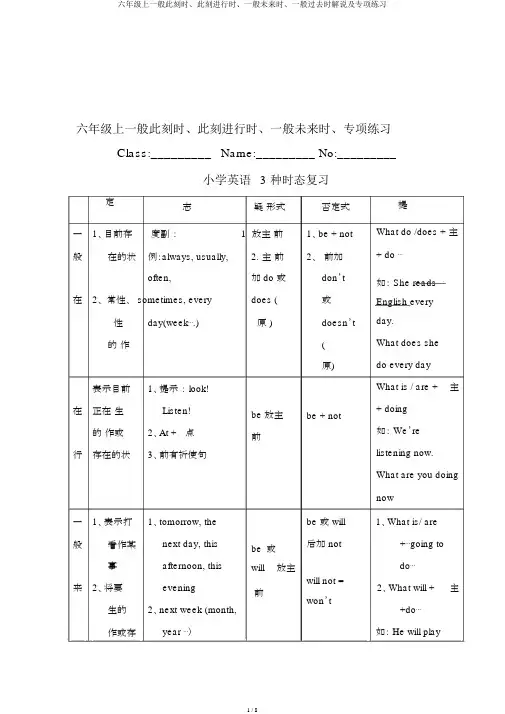
六年级上一般此刻时、此刻进行时、一般未来时、专项练习Class:_________Name:_________ No:_________小学英语 3 种时态复习定志疑形式否定式一1、目前存度副: 1 放主前1、be + not 般在的状例:always, usually, 2. 主前2、前加often,加 do 或don’t 在2、常性、 sometimes, every does (或性day(week⋯.)原 )doesn’t的作(原)表示目前1、提示: look!在正在生Listen!be 放主be + not 的作或2、At + 点前行存在的状3、前有祈使句提What do /does + 主+ do ⋯如: She reads English every day.What does shedo every dayWhat is / are +主+ doing如: We’re listening now. What are you doing now一1、表示打1、tomorrow, the be 或 will1、What is/ are 般看作某next day, this be或后加 not+⋯going to 事afternoon, this will放主do⋯来2、将要eveningwill not =2、What will +主前won’t生的2、next week (month,+do⋯作或存year ⋯)如: He will play在的状3、in the year 2007basketball next态week.What will he donext week一、用动词的正确形式填空1.I ________________ (do) my homework every evening.2.We _________________ (fly) kites in the park next Sundays.3.Tom ___________(play) the piano every Saturday. Now he________ (play).4.She _______(like) swimming. She ___________ (swim) this weekend.ually my mother _______ (wash) the dishes after lunch. But mygrandma____________ (wash) now.6.Look at the man! He ___________ (read) a magazine.7.Look! The plane ______________ (fly) over the building.8. Listen! My aunt ____________ (sing) in the is a singer.She _____(like) singing. She _______(have) a music show. She is excited.9.Tom and Mike always ______ (swim) in the river. They _____ (swim)in the swimming pool this Sunday. Look! They ______ (swim).10.What ______ you usually ______ (do) in the eveningI _______ (play) computer games.11. What _______ you _______ (do) nowI _______ (make) a paper plane.12. What _______ he _______ (do) nowHe ______ (dance).13.______ your mother ______ (read) newspaper in themorning Yes, She ________ .16._______ you _______ (like) fishingNo, I ______ . I like ______ (swim),but my brother ______ (like).17.How ______ your father _______ (go) to work every dayHe ______ ( go) by bike.But it ’s cold today. He ______ (take) the bus,18._______ the monkey _______ (like) climbing trees Yes, it _______ .19.What _______ your father______ (do) after lunch He _______ (read)a comic book.20.________ you ______ (collect) stamps Yes. I _______ .________ your brother ______ (collect), too No, he ________ .二、选择题1. _____ he _____ to the park at 6:30 in the morning No,he _____ .A. Does; goes; doesB. Does; go; doesn’tC. Does; go; does2.Tim always _____ a picture at home. He _____ a car now.A. draws; is drawingB. draw; drawC. draws; draw3.She usually _____ her friends. They often _____ tea.A. see; drinkB. sees; drinksC. sees; drink4. He usually _____ the dishes at night, but tonight he _____ clothes.A. wash; washB. washes; is going to washC. is washing; washes5. Mr. Green usually _____ his newspaper in the evening, but he andhis wife _____ television this evening.A. reads; watchesB.reads; are going to watchC.reads;are the man and the woman They _____ near the tree.A. sitB. sitsC. are sitting7. _____ your father _____ diving No, he _____ .He ______ writingstories.watch; like; doesn’t; likes; likes; doesn’t; like; like; don’t;likes8.Mr. Green often _____ his newspapers at night. But he _____ aninteresting book tonight.A. reads; readsB.reads; readC.reads; is going to9. The old man _____ playing sports in the park. He _____ morningexercise now.A. likes; is doingB. likes; doesC. like; doing10. Where ______ the boy _____ He _____ across the river now.A. does; swim; swimsB. is; swimming; is swimmingC. is, swim, is swimming11. _____ you _____ to music now Yes, we _____ .A. Do; listen;doB. Did; listen;didC.Are; listening;12. Look! Two cats ______ across the wall.A. runB. runsC. are running read are13. She _____ tea, but he _____ .A. likes; doesn’t B; like; don’t C. like; doesn’t 一般过去时一般过去时的构成:一般过去时是用动词的过去式来表示。
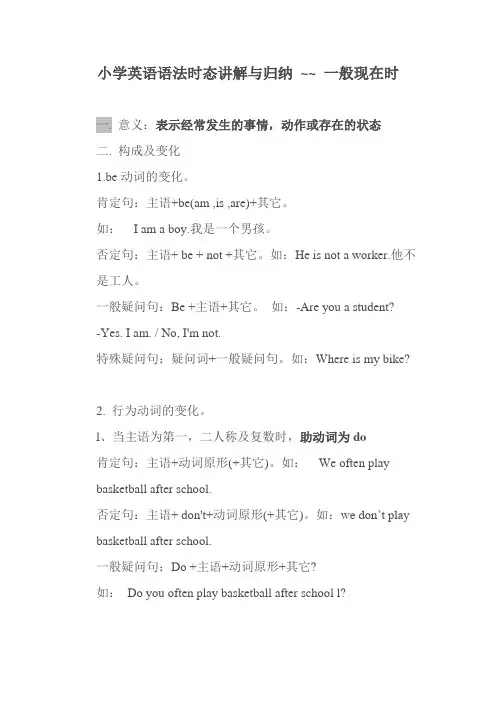
小学英语语法时态讲解与归纳~~ 一般现在时一. 意义:表示经常发生的事情,动作或存在的状态二. 构成及变化1.be动词的变化。
肯定句:主语+be(am ,is ,are)+其它。
如:I am a boy.我是一个男孩。
否定句:主语+ be + not +其它。
如:He is not a worker.他不是工人。
一般疑问句:Be +主语+其它。
如:-Are you a student?-Yes. I am. / No, I'm not.特殊疑问句:疑问词+一般疑问句。
如:Where is my bike?2. 行为动词的变化。
l、当主语为第一,二人称及复数时,助动词为do肯定句:主语+动词原形(+其它)。
如:We often play basketball after school.否定句:主语+ don't+动词原形(+其它)。
如:we don’t play basketball after school.一般疑问句:Do +主语+动词原形+其它?如:Do you often play basketball after school l?Yes, we do. / No, we don't.特殊疑问句:疑问词+以do开头的一般疑问句?如:What do you often do after school ?2、当主语为第三人称单数时,助动词为does肯定句:主语+动词三单式(+其它)。
如:He swims well.否定句:主语+ doesn’t+动词原形(+其它)。
如:He doesn’t swim well..一般疑问句:Does +主语+动词原形+其它。
如:Does he swim well ?Yes, he does. / No, he doesn't.特殊疑问句:疑问词+以does开头的一般疑问句?如:How does your father go to work?三.第三人称单数的动词变化规则(只有在第三人称为主语的肯定句中,动词才用三单式)(1)多数动词直接加s:runs gets likes collets takes plays climbs…….(2)结尾是s, x, sh, ch, o,前为辅音字母,结尾加es :watches goes does washes brushes(3)动词末尾y前为辅音:将y改为i加es:study→studies fly→flies carry→carries cry→cries但在y前如果为元音则直接加s:buys says四.时间标志:always总是, usually经常, often经常, sometimes 有时,every…每~一般现在时练习题(1)I.用下列单词的适当形式填空1.We often___________(play) in the playground.2.He _________(get) up at six o’clock.3.__________you _________(brush) your teeth everymorning?4.What________________(do) heusually________________(do) after school?5.Danny ________________(study) English, Chinese,maths, science and Art at school.6.Mike sometimes __________(go) to the park with hissister.7.At eight at night, she __________(watch) TV with hisparents.8.________ Mike________(read) English every day?Ⅱ单项选择。
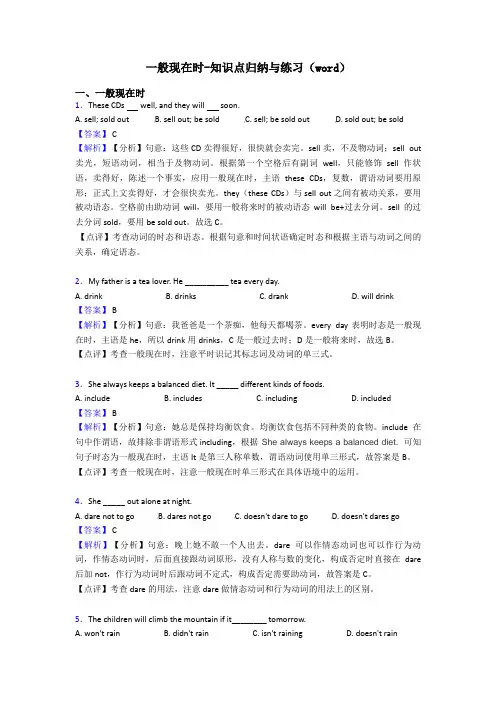
一般现在时-知识点归纳与练习(word)一、一般现在时1.These CDs well, and they will soon.A. sell; sold outB. sell out; be soldC. sell; be sold outD. sold out; be sold【答案】 C【解析】【分析】句意:这些CD卖得很好,很快就会卖完。
sell卖,不及物动词;sell out 卖光,短语动词,相当于及物动词。
根据第一个空格后有副词well,只能修饰sell作状语,卖得好,陈述一个事实,应用一般现在时,主语these CDs,复数,谓语动词要用原形;正式上文卖得好,才会很快卖光。
they(these CDs)与sell out之间有被动关系,要用被动语态。
空格前由助动词will,要用一般将来时的被动语态will be+过去分词。
sell的过去分词sold,要用be sold out。
故选C。
【点评】考查动词的时态和语态。
根据句意和时间状语确定时态和根据主语与动词之间的关系,确定语态。
2.My father is a tea lover. He __________ tea every day.A. drinkB. drinksC. drankD. will drink【答案】 B【解析】【分析】句意:我爸爸是一个茶痴,他每天都喝茶。
every day表明时态是一般现在时,主语是he,所以drink用drinks,C是一般过去时;D是一般将来时,故选B。
【点评】考查一般现在时,注意平时识记其标志词及动词的单三式。
3.She always keeps a balanced diet. It _____ different kinds of foods.A. includeB. includesC. includingD. included【答案】 B【解析】【分析】句意:她总是保持均衡饮食。
一般现在时态一、一般现在时的定义一般现在时表示现在经常反复发生的动作,存在的状态或习惯性的动作的时态。
二、一般现在时的结构一般现在时用行为动词的原形,但第三人称单数作主语时,动词的词尾要加-s 或-es。
现在以连系动词be 和行为动词read为例,对一般现在时的肯定句、连系动词be 的各种形式常与代词或not缩写成一个词。
助动词do,does 一般只有与not 缩写。
联系动词be缩写形式如下动词do not 的缩写形式为don’t,does not 的缩写形式为doesn’t。
三、动词加-s 或-es (动词第三人称单数)当主语是第三人称单数时,谓语动词需加-s 或-es1.一般在词尾加–s例:work—works leave --- leaves swim --- swims2.以字母s,x,ch,sh 或o结尾的词加-es例:pass--- passes fix ---fixes teach --- teaches do--- does 3.以辅音字母加y结尾的词,先变y为i再加-es例:study --- studies carry --- carries fly --- flies cry --- cries四、一般现在时的用法4.表示经常或习惯性的动作。
常与often(经常), always(总是), sometimes (有时), every day(每天), on Sundays/Mondays 等表示频度的时间状语连用。
一般现在时的时间状语有:today, often, sometimes, always, usually, every day ( week, month, year,…) , this year, once a week ( month, year,…) 一周(月,年)一次例句:I get up at 6 o’clock every day.He often goes to school by bike.5.表示客观事实,普遍真理。
一般现在时专项讲解及练习题一、概念:一般现在时表示现在经常反复发生的动作、存在的状态或习惯性的①经常性或习惯性动作,常与表示频度的时间状语连用。
如:often,always,sometimes, every …, on Sunday等;I go to school on weekdays.a.肯定句中,只出现实义动词,如:I get up in the morning.我早晨起床。
b.否定句中,要在实义动词前面加do(does)+not,do(does)作助动词,本身无意义,常与not缩写成don't(doesn't),如:I don't like vegetables.我不喜欢蔬菜。
c.一般疑问句,要在句子开头加助动词Do(does),句尾用问号,简略答语用Yes,主语+do(does).或No,主语+do(does)+not.如:—Do you like oranges?—你喜欢桔子吗?—Yes,I do.—是的,我喜欢。
(—No,I don't.—不,我不喜欢。
)(一)单选:1. Where Lucy come from?A. doB. doesC. isD. are2. Most of the students China.A. comes fromB. is fromC. are fromD. come of3. We speak English .A. every daysB. everydayC. very dayD. every day4. My math teacher a big pair of glasses.A. wearsB. put onC. wearD. puts on5. What your father and mother ?A. does, doB. do, doC. are, doD. do, does(二)用动词适当形式填空:1. His radio is broken. It (sound)terrible.2. Did somebody drop water on the rug? It (look)wet.3. Every year my parents (give)me a present for my birthday.4. The club (send)her a letter every month.5. your dad (wash)his car once a week? Yes, he does.6. Lin Tao is a good student. He (study)very hard.7. They (work)at the bank.(三)句型转换:1. My living room has three windows. (改为否定句)2. Jim and Jack like swimming on Sundays.(就划线部分提问)3. We are in the same class. (改为一般疑问句)4. He comes from England.(就划线部分提问)一、用所给动词的适当形式填空。
一般现在时三单动词的变化规则及练习题1.一般情况下,直接加-s 2.以s. x. sh. ch. o 结尾,加-es 3.以“辅音字母+y”结尾,变y 为i, 再加- es一、写出下列动词的第三人称单数drink go stay make look have pass carrycome watch sing fly study brush do teach二、用括号内动词的适当形式填空。
1.He often (have) dinner at home.2.Daniel and Tommy (be) in Class One.3.We (not watch) TV on Monday.4.Nick (not go) to the zoo on Sunday.5.What they often (do) on Sundays?6.your mother (read) newspapers every day?7.Mike (like) cooking. 8. I (be) ill. I’m in bed. 9. Liu Tao (do) not like PE.10. The child often (watch) TV in the evening.三、按照要求改写句子1.He watches TV every evening.(改为否定句)2.I do my homework every day.(改为一般疑问句,作否定回答)3.She likes books.(改为一般疑问句,做肯定回答)4.Amy likes playing computer games.(改为一般疑问句,作否定回答)5.We go to school on Sundays.(改为否定句)四、改错(划出错误的地方,将正确的写在横线上)1. Is your brother like English?2. Does he likes swimming?3. He likes play games.4. She don’t do her homework on Sundays.五、把句子补充完整。
一般现在时一般现在时的定义:表示经常性的事情,经常性的动作或一般性事实。
一般现在时的标志词:often 经常,usually通常,always 总是,every每个,sometimes 有时一般现在时的结构:只有在主语是第三人称单数时动词发生“三单变化”,其他用动词的原形。
三单变化:1.多数在动词后+s play — plays like — likes(1)直接在动词词尾加-s.ask---asks work---works get---gets stay---stays(2)以字母s, x, ch, sh或o结尾的动词,在词尾直接加-es.watch---watches wish---wishes fix---fixes do---doesgo---goes pass---passes(3)以“辅音字母加- y”结尾的动词,要先变y为i再加-es.try---tries study---studies cry---cries fly---flies2.不规则变化:be---- is are have----has二、一般现在时用法1. 表示经常性,习惯性,永久性的动作或存在的状态.通常与副词sometimes, often, usually, always, every day (year, month ), once (twice, three times) a day,等时间状语连用。
They usually go to school by bike.I take the medicine three times a day.She helps her mother once a week.Mary’s father is a policeman.There are 50 students in my class.2. 表示客观真理,科学原理,自然现象,等客观事实或格言,谚语等。
The sun rises in the east and sets in the west every day.The man who has never been to the Great Wall is not a real man.Tomorrow is Tuesday.三、一般现在时的句子转换:(1)当句子中有be动词或情态动词时,则把be动词或情态动词(can,could 等等)提到主语的前面变成疑问句;在be动词或情态动词后面加not变成否定句.例:①陈述句:She is a student.疑问句→ Is she a student?否定句→ She is not a student.②陈述句:I can swim.疑问句→ Can you swim否定句→ I can not swim.(2)当句子中即没有be动词,也没有情态动词时,则在主语前加助动词do (you,以及复数), does(单数she,he,it)变成问句;在主语后谓语动词前加助动词don’t(I,you,以及复数), doesn’t(单数she,he,it)变成否定句,助动词后的动词要变成动词原形。
小学英语语法【一】一般现在时一般现在时基本用法介绍一、一般现在时的功能1.表示事物或人物的特征、状态。
如:The sky is blue.天空是蓝色的。
2.表示经常性或习惯性的动作。
如:I get up at six every day.我每天六点起床。
3.表示客观现实。
如:The earth goes around the sun.地球绕着太阳转。
二、一般现在时的构成1.b e 动词:肯定句:主语+be(am,is,are)+其它。
如:I am a boy. 我是一个男孩。
2.行为动词:肯定句:主语+行为动词(+其它)。
如:We study English.我们学习英语。
当主语为第三人称单数(he, she,it)时,要在动词后加"-s"或"-es"。
如:Mary likes Chinese.玛丽喜欢汉语。
动词+s 的变化规则1.一般情况下,直接加-s,如:cook-cooks,2.以s. x. sh. ch. o 结尾,加-es,如:guess-guesses, wash-washes, watch-watches, go-goes3.以“辅音字母+y”结尾,变y 为i, 再加-es,如:study-studies特殊:have --- h as三、一般现在时的变化1.b e 动词的变化。
否定句:主语+ be + not +其它。
如:He is not a worker.他不是工人。
一般疑问句:Be +主语+其它。
如:-Are you a student? -Yes. I am. / No, I'm not.特殊疑问句:疑问词+一般疑问句。
如:Where is my bike?2.行为动词的变化。
否定句:主语+ don't( doesn't ) +动词原形(+其它)。
如:I don't like bread.当主语为第三人称单数时,要用doesn't 构成否定句。
一般现在时的讲解及练习般现在时是英语中应用最广泛的时态之一,是初中英语语法重点。
一般现在时表示:1.经常性、习惯性的动作或存在的状态。
e.g. I go to school on foot. He is very busy now. 2.表示主语的特征、性格、能力、爱好等。
e.g. He can swim. I work hard. I like watching TV. 3.表示客观真理。
e.g. There are seven days in a week. The moon moves round the earth. 其结构按正常语序,即“主语+谓语+其它”,有时为了起强调作用,时间状语也可提前.其句式变化可分为两种情况:1.表示动作,一般人称作主语的,变否定句须在动词前加助动词don';变一般疑问句须在句首加助动词do。
E.g. They have lunch at 12:00.They don't have lunch at 12:00.Do they have lunch at 12:00?2.单三人称做主语的,变否定句须在动词前加助动词doesnt;变一般疑问句须在句首加助动词does。
E.g. Jenny speaks English very well.Jenny doesnt speak English very well.Does Jenny speak English very well?含有be动词的要在be上做变化:E.g. Danny is a good student.Danny isn't a good student.Is Danny a good student?其时间状语为often、usually、always、sometimes等频率副词,on Saturdays、in the morning(afternoon evening) 、every day 等。
一般现在时一般现在时的定义:表示经常性的事情,经常性的动作或一般性事实。
一般现在时的标志词:often 经常,usually通常,always 总是,every每个,sometimes 有时一般现在时的结构:只有在主语是第三人称单数时动词发生“三单变化”,其他用动词的原形。
三单变化:1.多数在动词后+s play — plays like — likes(1)直接在动词词尾加-s.ask---asks work---works get---gets stay---stays(2)以字母s, x, ch, sh或o结尾的动词,在词尾直接加-es.watch---watches wish---wishes fix---fixes do---doesgo---goes pass---passes(3)以“辅音字母加- y”结尾的动词,要先变y为i再加-es.try---tries study---studies cry---cries fly---flies2.不规则变化:be---- is are have----has二、一般现在时用法1. 表示经常性,习惯性,永久性的动作或存在的状态.通常与副词sometimes, often, usually, always, every day (year, month ), once (twice, three times) a day,等时间状语连用。
They usually go to school by bike.I take the medicine three times a day.She helps her mother once a week.Mary’s father is a policeman.There are 50 students in my class.2. 表示客观真理,科学原理,自然现象,等客观事实或格言,谚语等。
The sun rises in the east and sets in the west every day.The man who has never been to the Great Wall is not a real man.Tomorrow is Tuesday.三、一般现在时的句子转换:(1)当句子中有be动词或情态动词时,则把be动词或情态动词(can,could 等等)提到主语的前面变成疑问句;在be动词或情态动词后面加not变成否定句.例:①陈述句:She is a student.疑问句→ Is she a student?否定句→ She is not a student.①陈述句:I can swim.疑问句→ Can you swim否定句→ I can not swim.(2)当句子中即没有be动词,也没有情态动词时,则在主语前加助动词do (you,以及复数), does(单数she,he,it)变成问句;在主语后谓语动词前加助动词don’t(I,you,以及复数), doesn’t(单数she,he,it)变成否定句,助动词后的动词要变成动词原形。
例:①陈述句:We get up at 7:00 every morning.疑问句→Do you get up at 7:00 every morning?否定句→We don’t get up at 7:00 every morning.①陈述句:She has a little brother.疑问句→ Does she have a little brother?否定句→ She doesn’t have a little brother.(一).用动词的适当形式填空1. She _________(go) to school at seven o’clock.2. He usually ___________ up at 17:00.(get )3. She ___________ (live) in Beijing.4. My father __________ (watch) TV every evening.5.________ Amy _________ (read) English every day?6. Chen Jie sometimes _________(go)to the park with her sister.(二).选择填空7.I want____homework now. A. doing B. to do C. to do my D. do my 8.It's time______.A. go to schoolB. play gamesC. to go homeD. to do my homework 9.______go and help her. A. Let's me B. Let's us C. Let's D. Let's to 10.Do they have a new car? Yes,_____.A .they are B.they have C. they don't D. they do11.He often _________ supper at 6:00 in the evening.A. haveB. has c. is having D. is eating12. We _____________ any Chinese classes on Friday.A. are havingB. aren’t havingC. don’t haveD. are have(三)、用括号内动词的适当形式填空。
13. He often _________ (have) dinner at home.14. Daniel and Tommy _________ (be) in Class One.15. We _________ (not watch) TV on Monday.16. Nick_________ (not go) to the zoo on Sunday.17. _________they _________ (like) the World Cup?18. What _________ they often_________ (do) on Saturdays?19. _________your parents _________ (read) newspapers every day?20. The girl _________ (teach) us English on Sundays.21. She and I _________ (take) a walk together every evening.22. There _________ (be) some water in the bottle.23. Mike_________ (like) cooking.24. They _________ (have) the same hobby.25. My aunt _________ (look) after her baby carefully.26. You always _________ (do) your homework well.27. I _________ (be) ill. I’m staying in bed.28. She _________ (go) to school from Monday to Friday.29. Liu Tao _________ (do) not like PE.30. The child often _________ (watch) TV in the evening.31. Wang Kai and Wang li_________ (have) eight lessons this term.32. -What day _________ (be) it today?-It’s Saturday.33.We often___________(play) in the playgound.34.He _________(get) up at six o’clock.35. __________you _________(brush) your teeth every morning.36. What __________(do) he usually _________ (do) after school?37. Danny__________(study) English,Chinese,Maths,Science and Art an school.38. Mike sometimes __________(go) to the park with his sister39. At eight at night, she __________(watch) TV with his parents.40. ________ Mike________(read) English every day?41. How many lessons_________your classmate________(have) on Monday?42.What time_________his mother_________(do) the housework?43. Do you often play football after school? (肯定回答)______________________________________________________44. I have many books.(改为否定句)______________________________________________________45. Gao Shan’s sister likes playing table tennis (改为否定句)______________________________________________________46. She lives in a small town near New York.(改为一般疑问句)______________________________________________________47. I watch TV every day. (改为一般疑问句)______________________________________________________48. David has got a goal. (改为一般疑问句)______________________________________________________49. We have four lessons.(否定句)______________________________________________________50. Nancy doesn’t run fast (肯定句)______________________________________________________51.My dog runs fast.一般疑问句:__________________________________________否定句:__________________________________________52.Mike has two letters for him.一般疑问句:__________________________________________否定句:__________________________________________53.I usually play football on Friday afternoon.否定句:__________________________________________一般疑问句:__________________________________________划线提问:__________________________________________ 54.Su Yang usually washes some clothes on Saturday.否定句:__________________________________________一般疑问句:__________________________________________划线提问:__________________________________________ 55.Mingming usually waters the flowers every day否定句:__________________________________________一般疑问句:__________________________________________划线提问__________________________________________ 56.Tom does his homework at home.否定句:__________________________________________一般疑问句:__________________________________________划线提问__________________________________________。